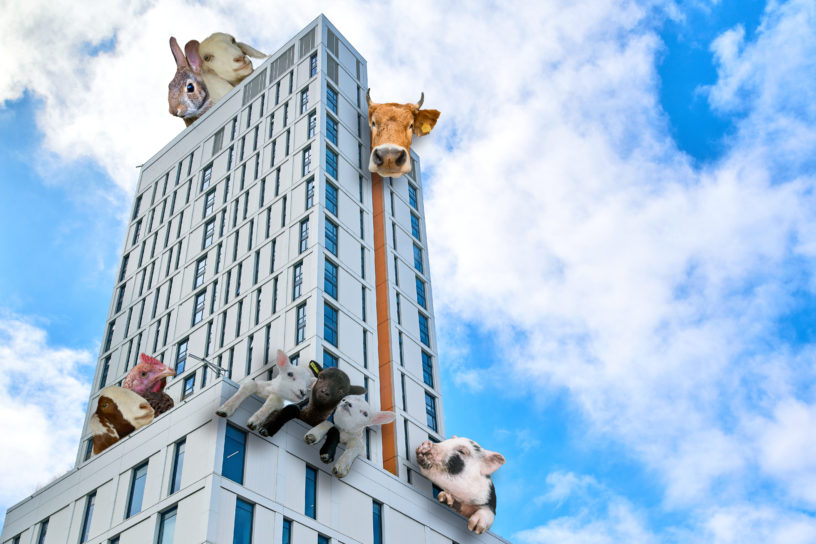By Adriana Fallico
Disclaimer: This article is entirely fiction—only squirrels, raccoons and pigeons terrorize our campus.
Have you ever wondered if the moo of a cow would be a functional alarm clock? Thanks to the success of the campus’ Urban Farms, Toronto Metropolitan University (TMU) has introduced a new livestock initiative on the roof of the Daphne Cockwell Complex (DCC).
The third rooftop farm will house a variety of animals, such as chickens, pigs, cows, ostriches and a capybara on loan from the University of São Paulo.
Since the installation, several students living in the DCC have seen a drastic improvement in their lifestyles.
Rufus Pawster, a first-year environment and urban sustainability student living at the DCC said he “has never felt more at peace” since the animals arrived.
“Starting every morning by taking a deep whiff of fresh cow manure has really changed my outlook on life,” he said. “I didn’t realize before how sick I was with dealing with people. Now I get to hang out with flamingos everyday!”
He even feels that living amongst wildlife helps him connect with his program.
“Seeing how different ecosystems live amongst each other, especially so close to me, is truly inspiring,” he said, wiping tears from his face.
“I truly believe the animals were trying to send me a sign.”
Squeak Fuzzbutt, a third-year geographic analysis student who lives on the top floor of the DCC, has seen some “odd, yet touching shit” since she moved in.
“One time, I made a joke to a friend that I would drop out when pigs fly, and I saw the largest, hairiest hog majestically fall off the roof,” said Fuzzbutt. “I truly believe the animals were trying to send me a sign.”
Fuzzbutt cited another incident where she witnessed the school’s therapy dogs “joyriding on the ostriches’ backs” as a subliminal message that she should rekindle her relationship with her mother.
There have been quite a few additional living benefits for residence students.
For example, students will be charged an extra 27 dollars on their meal plan to acquire fresh eggs and milk straight from the farm (all self-serve, naturally). Bacon will be sold seperately at an additional cost.
“[The animals] are doing me a favour by letting me live here”
The farm also offers residence students a variety of on-campus work opportunities, such as feeding leftover dining hall scraps to the animals, washing them and personally grooming their backsides.
Students even have the support from the school’s faculty, as TMU president Mohamed Lachemi has been seen getting his hands dirty. Fuzzbutt recounted one time where she saw Lachemi aimlessly chasing the chickens back into their coop.
“It really gives me the impression that TMU is a hands-on university and everyone is willing to lend a helping hand,” Fuzzbutt said.
Pawster said keeping up with these farm work responsibilities can be “difficult and sometimes nauseating,” but ultimately feels indebted to the animals.
“I just remind myself that the DCC is the animals’ home now and they are doing me a favor by letting me live here,” he said. “It is their world and I am lucky to be living in it.”












Leave a Reply